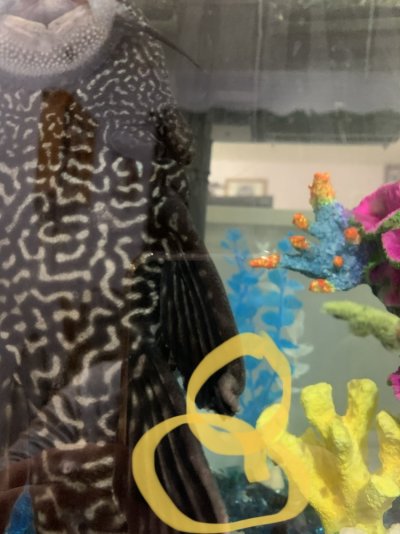You are using an out of date browser. It may not display this or other websites correctly.
You should upgrade or use an alternative browser.
You should upgrade or use an alternative browser.
Thickening on pleco fins
- Thread starter Sirabi76
- Start date
The friendliest place on the web for anyone with an interest in aquariums or fish keeping!
If you have answers, please help by responding to the unanswered posts.
If you have answers, please help by responding to the unanswered posts.
How often do you do water changes?
Do you test the water parameters of your tank?
Do you vac the gravel/substrate, how often?
The substrate may be dirty in the area he hangs out in, Plecos can be big poopers, gets a bit too mucky, and he might hide in that corner/spot most of the time and have more bacteria build up in that spot causing some fin rot.
Try cleaning/ vac'ing the spots he sleeps/sits in the most.
Are you familiar with the nitrification cycle?
Make sure to have a decent amount of water dechlorinator on hand and plenty of time.
If you do weekly water changes then do a couple back to back water changes you can do vac'ing in those spots - instead of one pwc.
Alternately do the vac'ing till the water level is close to but not low enough to turn off the filter. Then fill up and do more vac'ing, repeat, repeat.
Then if it isn't cleaned up enough then the next day do another vac'ing in those spots. It doesn't need to be spotless but focus the vacing just on the spots he hangs out in.
If you start vac'ing every where in the tank you could disrupt too much muck under the gravel and cause a mess in the tank.
IF you do NOT do frequent water changes then you want to proceed in the water changing more slowly.
This is because the difference in the water of the new tap water is so very much more different than the tank water which has been in the tank and would have a very much higher TDS due to just adding refill water instead of doing water removal.
Fast / large amounts of water changing after no water changes for a long period can cause shock resulting in death if not made gradually.
Do you test the water parameters of your tank?
Do you vac the gravel/substrate, how often?
The substrate may be dirty in the area he hangs out in, Plecos can be big poopers, gets a bit too mucky, and he might hide in that corner/spot most of the time and have more bacteria build up in that spot causing some fin rot.
Try cleaning/ vac'ing the spots he sleeps/sits in the most.
Are you familiar with the nitrification cycle?
Make sure to have a decent amount of water dechlorinator on hand and plenty of time.
If you do weekly water changes then do a couple back to back water changes you can do vac'ing in those spots - instead of one pwc.
Alternately do the vac'ing till the water level is close to but not low enough to turn off the filter. Then fill up and do more vac'ing, repeat, repeat.
Then if it isn't cleaned up enough then the next day do another vac'ing in those spots. It doesn't need to be spotless but focus the vacing just on the spots he hangs out in.
If you start vac'ing every where in the tank you could disrupt too much muck under the gravel and cause a mess in the tank.
IF you do NOT do frequent water changes then you want to proceed in the water changing more slowly.
This is because the difference in the water of the new tap water is so very much more different than the tank water which has been in the tank and would have a very much higher TDS due to just adding refill water instead of doing water removal.
Fast / large amounts of water changing after no water changes for a long period can cause shock resulting in death if not made gradually.
Oh, and just getting the tank water cleaned up is often enough to allow the fins to heal.
The filter pad is the center for beneficial bacteria colony growth, and so if you haven't lately, do not rinse it with tap water or water that isn't dechlorinated.
If you aren't familiar with the nitrification cycle read the article in my signature which will help.
The filter pad is the center for beneficial bacteria colony growth, and so if you haven't lately, do not rinse it with tap water or water that isn't dechlorinated.
If you aren't familiar with the nitrification cycle read the article in my signature which will help.
Similar threads
- Replies
- 3
- Views
- 539
- Replies
- 3
- Views
- 505
- Replies
- 3
- Views
- 418
- Replies
- 3
- Views
- 803

